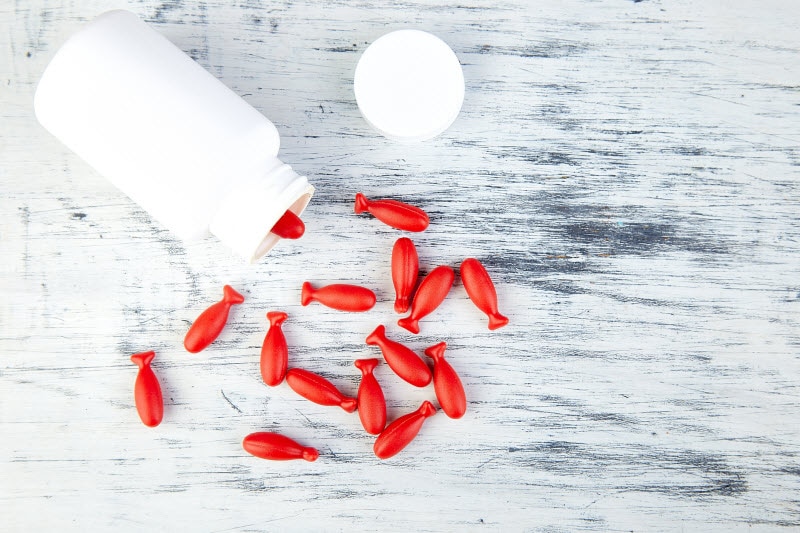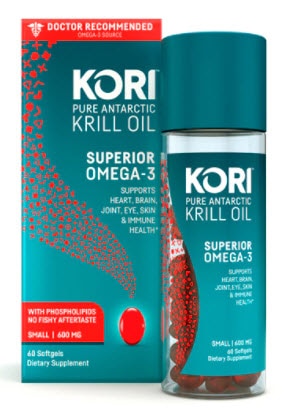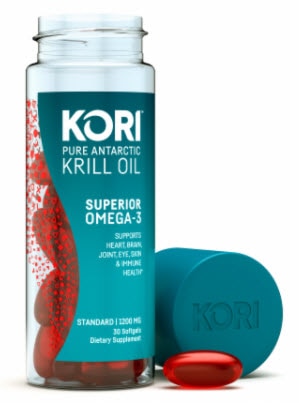Not getting enough omega-3s – important nutrients our bodies need for health – is common. They’re found in a variety of foods, with fatty fish such as salmon, tuna and sardines being one of the best sources. However, many Americans don’t consume the two servings of fish per week recommended by The American Heart Association. Plant foods (such as walnuts and flaxseeds) are another way to get omega-3s; however, they don’t deliver two specific types (DHA and EPA) that are scientifically shown to offer health benefits. †
If you think your diet is lacking in health-supportive omega-3s, consider adding krill oil supplements to your wellness routine. Why krill oil? Read on to learn more about it.
8 Krill Oil Benefits to Consider
1. Krill oil omega-3s may support heart health†
Supportive but not conclusive research shows that EPA and DHA omega-3 fatty acids play a part in helping to maintain cardiovascular health. The omega-3s in krill oil may support normal triglyceride levels while also supporting the ‘good’ type of cholesterol, known as HDL. Krill oil omega-3s may also support normal circulation and heart rhythm. Plus, they can support blood pressure levels already within normal range. †
2. Krill oil omega-3s promote healthy brain function†
Omega-3s play an important role in the health, structure and function of brain cell membranes. Omega-3s are known to serve as brain cell lubricants and help make brain cell membranes more flexible. Additionally, EPA is linked to mood and behavioral health, while DHA is essential for both prenatal and postnatal brain development. Unlike fish oil and other omega-3 supplements, krill oil uniquely delivers omega-3s in a phospholipid form – which allows them to transfer across the blood-brain barrier. †
![Kori Pure Antarctic Krill Oil Omega-3 Kori Pure Antarctic Krill Oil Omega-3 | Vitacost.com/blog]() 3. Krill oil omega-3s help support immune health†
3. Krill oil omega-3s help support immune health†
If you’re familiar with the functions of the immune system, you probably are already aware that the inflammation plays a big part. Known for supporting a healthy inflammatory response in the body – and for supporting cellular repair and our overall internal defense systems – omega-3 essential fatty acids are key nutrients for immune health. †
4. Krill oil omega-3s support healthy joint function†
Omega-3s also may support joint comfort and flexibility as we get older. In one clinical trial, 90 subjects each received 300 mg krill oil daily for 30 days. After seven days, krill oil was found to reduce joint pain by 28.9%, reduce joint stiffness by 20.3% and reduce functional joint impairment by 22.8% in comparison to the placebo group. †
5. Krill oil omega-3s help maintain skin hydration†
Healthy, hydrated, youthful skin depends on proper nutrition. Did you know that omega-3s help reduce water loss through our skin? They’re also needed to maintain the integrity of the skin’s protective barrier function against environmental factors. To avoid dry skin and keep your skin naturally well protected, be sure your diet is rich in omega-3s, or consider taking a krill oil omega-3 supplement.
6. Krill oil omega-3s support eye health†
The retinas in our eyes contain photoreceptors with fluid membranes that are enriched with omega-3 DHA essential fatty acids. Studies in rodents and primates suggest that omega-3s may support retinal health and structure. †
![Kori Krill Oil Superior Omega-3 Kori Krill Oil Superior Omega-3 | Vitacost.com/blog]() 7. Krill oil offers superior absorption compared to fish oil†
7. Krill oil offers superior absorption compared to fish oil†
As noted above, krill oil supplies omega-3s in phospholipid form – the same form you’d get if you ate fatty fish like salmon. Fish oil, on the other hand, contains omega-3s as triglycerides (phospholipids are lost during fish oil processing). Phospholipids enable krill oil’s superior omega-3 absorption compared to fish oil. Another bonus? Phospholipids blend more easily in our digestive systems. As a result, you won’t get “fishy burps” from krill oil, as you might when consuming fish oil. †
8. Krill oil also delivers the essential nutrient choline†
In addition to omega-3s, krill oil naturally supplies another essential nutrient – choline. Choline is crucial for supporting the structure and function of cells that support our brain, nervous system, liver and metabolic health. Look for a krill oil supplement with at least 50 mg of choline per serving.†
†These statements have not been approved by the Food and Drug Administration. These products are not intended to diagnose, treat, cure or prevent disease.



